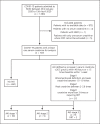Risk Factors for Development of Acute Kidney Injury in COVID-19 Patients: A Retrospective Observational Cohort Study
- PMID: 33780937
- PMCID: PMC8089436
- DOI: 10.1159/000514064
Risk Factors for Development of Acute Kidney Injury in COVID-19 Patients: A Retrospective Observational Cohort Study
Abstract
Introduction: Acute kidney injury (AKI) in coronavirus infection disease (COVID-19) is associated with disease severity. We aimed to evaluate risk factors associated with AKI beyond COVID-19 severity.
Methods: A retrospective observational study of COVID-19 patients admitted to a tertiary hospital in Singapore. Logistic regression was used to evaluate associations between risk factors and AKI (based on Kidney Disease Improving Global Outcomes criteria). Dominance analysis was performed to evaluate the relative importance of individual factors.
Results: Seven hundred seven patients were included. Median age was 46 years (interquartile range [IQR]: 29-57) and 57% were male with few comorbidities (93%, Charlson Comorbidity Index [CCI] <1). AKI occurred in 57 patients (8.1%); 39 were in AKI stage 1 (68%), 9 in stage 2 (16%), and 9 in stage 3 (16%). Older age (adjusted odds ratio [aOR] 1.04; 95% confidence interval [CI]: 1.01-1.07), baseline use of angiotensin-converting enzyme inhibitor (ACE-I) or angiotensin receptor blocker (ARB) (aOR 2.86; 95% CI: 1.20-6.83), exposure to vancomycin (aOR 5.84; 95% CI: 2.10-16.19), use of nonsteroidal anti-inflammatory drugs (NSAIDs) (aOR 3.04; 95% CI: 1.15-8.05), and severe COVID-19 with hypoxia (aOR 13.94; 95% CI: 6.07-31.98) were associated with AKI in the multivariable logistic regression model. The 3 highest ranked predictors were severe COVID-19 with hypoxia, vancomycin exposure, and age, accounting for 79.6% of the predicted variance (41.6, 23.1, and 14.9%, respectively) on dominance analysis.
Conclusion: Severe COVID-19 is independently associated with increased risk of AKI beyond premorbid conditions and age. Appropriate avoidance of vancomycin and NSAIDs are potentially modifiable means to prevent AKI in patients with COVID-19.
Keywords: Acute renal failure; Chronic kidney disease; Creatinine.
© 2021 S. Karger AG, Basel.
Conflict of interest statement
Yong Pey See, Xi Yan Ooi, Wan Limm Looi, Chi Peng Chan, Li Wei Ang, See Cheng Yeo, and David Chien Lye have nothing to disclose. Barnaby Edwards Young reports personal fees from Sanofi and personal fees from Roche outside of submitted work.
Figures

References
-
- Wu Z, McGoogan JM. Characteristics of and important lessons from the coronavirus disease 2019 (COVID-19) outbreak in China: summary of a report of 72 314 cases from the Chinese Center for Disease Control and Prevention. JAMA. 2020;323((13)):1239–42. - PubMed
-
- Benussi A, Pilotto A, Premi E, Libri I, Giunta M, Agosti C, et al. Clinical characteristics and outcomes of inpatients with neurologic disease and COVID-19 in Brescia, Lombardy, Italy. Neurology. 2020 Aug 18;95((7)):e910–20. - PubMed
Publication types
MeSH terms
Substances
LinkOut - more resources
Full Text Sources
Other Literature Sources
Medical
Miscellaneous

